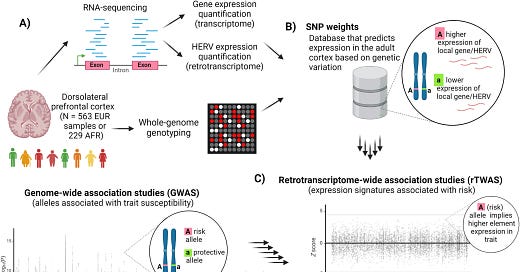Ancient Viruses in the Human Genome Linked to Mental Health Conditions
People with higher genetic risk for depression, schizophrenia, and bipolar disorder are more likely to have unusual activity levels of "fossil viruses" in their genomes
Ancient viruses that integrated into the human genome millions of years ago may influence the risk of mental health conditions such as depression, schizophrenia, and bipolar disorder. These viruses, remnants of retroviruses known as human endogenous retroviruses (HERVs), can exhibit abnormal activity levels in individuals genetically predisposed to thes…
Keep reading with a 7-day free trial
Subscribe to Anthropology.net to keep reading this post and get 7 days of free access to the full post archives.


